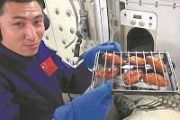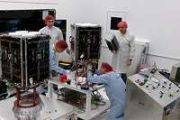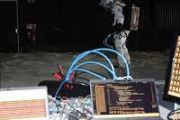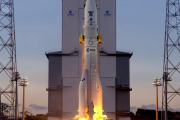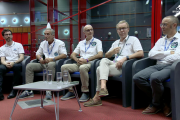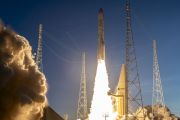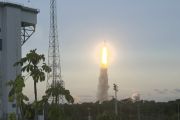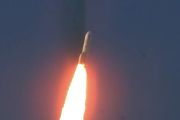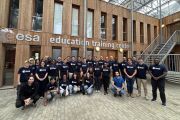
Copernical Team
Scientists recreate cosmic reactions to unlock astronomical mysteries
 Experiments will give scientists a closer look at how exploding stars create world's heaviest elements. How do the chemical elements, the building blocks of our universe, get built?
This question has been at the core of nuclear physics for the better part of a century. At the beginning of the 20th century, scientists discovered that elements have a central core or nucleus. These nuclei con
Experiments will give scientists a closer look at how exploding stars create world's heaviest elements. How do the chemical elements, the building blocks of our universe, get built?
This question has been at the core of nuclear physics for the better part of a century. At the beginning of the 20th century, scientists discovered that elements have a central core or nucleus. These nuclei con Mercury ahead
 The ESA/JAXA BepiColombo mission to Mercury will make the first of six flybys of its destination planet on 1 October before entering orbit in 2025.
Hot on the heels of its last Venus flyby in August, the spacecraft's next exciting encounter is with Mercury at 23:34 UTC on 1 October (01:34 CEST 2 October). It will swoop by the planet at an altitude of about 200 km, capturing imagery and sci
The ESA/JAXA BepiColombo mission to Mercury will make the first of six flybys of its destination planet on 1 October before entering orbit in 2025.
Hot on the heels of its last Venus flyby in August, the spacecraft's next exciting encounter is with Mercury at 23:34 UTC on 1 October (01:34 CEST 2 October). It will swoop by the planet at an altitude of about 200 km, capturing imagery and sci Study finds photosynthesis in Venus' clouds could support life
 New data analysis has found that the sunlight filtering through Venus' clouds could support Earth-like photosynthesis in the cloud layers and that chemical conditions are potentially amenable to the growth of microorganisms.
Biochemistry Professor Rakesh Mogul is the lead author of the study, Potential for Phototrophy in Venus' Clouds, published online this weekin the journal Astrobiology'
New data analysis has found that the sunlight filtering through Venus' clouds could support Earth-like photosynthesis in the cloud layers and that chemical conditions are potentially amenable to the growth of microorganisms.
Biochemistry Professor Rakesh Mogul is the lead author of the study, Potential for Phototrophy in Venus' Clouds, published online this weekin the journal Astrobiology' China's Chang'e-4 completes 1,000 days on far side of moon
 The lander and rover of the Chang'e-4 probe have worked for 1,000 Earth days on the far side of the moon as of Wednesday, according to the Lunar Exploration and Space Program Center of the China National Space Administration.
The lander and rover Yutu-2 are in good condition. The payloads aboard are also working properly and will continue the scientific exploration on the far side of the m
The lander and rover of the Chang'e-4 probe have worked for 1,000 Earth days on the far side of the moon as of Wednesday, according to the Lunar Exploration and Space Program Center of the China National Space Administration.
The lander and rover Yutu-2 are in good condition. The payloads aboard are also working properly and will continue the scientific exploration on the far side of the m NASA's Lucy science mission will fly by eight asteroids
 NASA plans to launch its Lucy spacecraft from Florida on Oct. 16 to fly by eight asteroids starting in 2025, marking the first time scientists will gain close-up views of them.
The spacecraft for the $981 million mission is at Kennedy Space Center for launch preparations, which include packing atop an Atlas V rocket for its 12-year voyage. United Launch Alliance plans to send the probe int
NASA plans to launch its Lucy spacecraft from Florida on Oct. 16 to fly by eight asteroids starting in 2025, marking the first time scientists will gain close-up views of them.
The spacecraft for the $981 million mission is at Kennedy Space Center for launch preparations, which include packing atop an Atlas V rocket for its 12-year voyage. United Launch Alliance plans to send the probe int Lake breach flooding played big role in Martian geography
 A significant amount - at least 25 percent - of Martian valley networks formed as a result of lake breach flooding, as reported in a paper on which Planetary Science Institute Research Scientist Alexander Morgan is an author.
This helps us better understand the past climate history of Mars, said Morgan, a co-author on "The importance of lake breach floods for valley incision on early Mars"
A significant amount - at least 25 percent - of Martian valley networks formed as a result of lake breach flooding, as reported in a paper on which Planetary Science Institute Research Scientist Alexander Morgan is an author.
This helps us better understand the past climate history of Mars, said Morgan, a co-author on "The importance of lake breach floods for valley incision on early Mars" FAA clears Virgin Galactic to resume flights after investigation
 The Federal Aviation Administration said Wednesday that Richard Branson's space tourism company can return to spaceflight after conducting an investigation into issues with the firm's July 11 launch.
A probe into the flight, which included Branson as a passenger, found the company's SpaceShipTwo deviated from its assigned airspace as it descended to Spaceport America in New Mexico, accordi
The Federal Aviation Administration said Wednesday that Richard Branson's space tourism company can return to spaceflight after conducting an investigation into issues with the firm's July 11 launch.
A probe into the flight, which included Branson as a passenger, found the company's SpaceShipTwo deviated from its assigned airspace as it descended to Spaceport America in New Mexico, accordi RockSat-X team witnesses experiment launched into space
 On the Eastern Shore of Virginia against a clear blue August sky, a sounding rocket stood ready on the launchpad at the NASA Wallops Flight Facility. With undergraduate student teams, faculty advisors, and family eagerly awaiting and viewing the launch via livestream coverage, the countdown began.
Late in the afternoon of Aug. 19, the Terrier-Improved Malemute sounding rocket successfully
On the Eastern Shore of Virginia against a clear blue August sky, a sounding rocket stood ready on the launchpad at the NASA Wallops Flight Facility. With undergraduate student teams, faculty advisors, and family eagerly awaiting and viewing the launch via livestream coverage, the countdown began.
Late in the afternoon of Aug. 19, the Terrier-Improved Malemute sounding rocket successfully Phantom Space announces agreement to build and launch 72 satellite constellation for Ingenu
 Phantom Space Corporation, a space transportation technology development and manufacturing company, has announced that they signed an agreement with Ingenu, provider of one of the leading Industrial Internet of Things (IIoT) technology platforms.
The agreement includes the production, manufacturing and launch of a 72 satellite constellation (AFNIO) that Ingenu will be utilizing to host the
Phantom Space Corporation, a space transportation technology development and manufacturing company, has announced that they signed an agreement with Ingenu, provider of one of the leading Industrial Internet of Things (IIoT) technology platforms.
The agreement includes the production, manufacturing and launch of a 72 satellite constellation (AFNIO) that Ingenu will be utilizing to host the Galileo ground control segment ready for full operational capability
 In early July the European Union Agency for the Space Programme (EUSPA) announced the upcoming upgrades of the Galileo GCS infrastructure in preparation for the next launch .
Today the new GCS V3.0 infrastructure has been completely deployed in the Galileo Ground Control Centres in Oberpfaffenhofen (Germany) and Fucino (Italy) and is being used to operate the Galileo Satellite Constellatio
In early July the European Union Agency for the Space Programme (EUSPA) announced the upcoming upgrades of the Galileo GCS infrastructure in preparation for the next launch .
Today the new GCS V3.0 infrastructure has been completely deployed in the Galileo Ground Control Centres in Oberpfaffenhofen (Germany) and Fucino (Italy) and is being used to operate the Galileo Satellite Constellatio 










